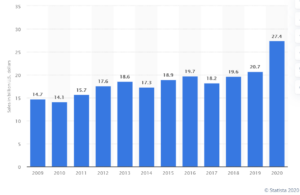What’s up? CBD again.
I can hardly keep up with the accounts of the CBD business. The business is booming.
The research? Not so much.
The regulation? Lagging.
Here are some recent items.
- NASDA, the National Association of State Departments of Agriculture, has a report on hemp.
- Plaintiff’s Bar turns attention to CBD with wave of lawsuits alleging products contain ‘significantly lower levels’ than advertised
redicted in the wake of reports highlighting discrepancies between actual and stated levels of CBD in consumer products, the plaintiff’s bar has turned its attention to the burgeoning category with a series of lawsuits alleging that products contain “significantly lower levels of CBD than advertised.”.. Read - CBD’s Novel Food status reiterated by German high courts: A higher court in Germany rules that cannabidiol (CBD) is a novel food confirming the decision made by one of the country’s administrative courts back in November last year. Read more
- Recall round-up: Hemp extract in spray and drug-contaminated supplements: Aphrodisiac supplements for men, an update to a cumin recall and a non-approved Novel Food found in a CBD dietary supplement are among notices issued by food agencies last month in NutraIngredients monthly round-up. Read more
- Italy adopts decree setting maximum THC levels in supplements: Italy’s Ministry of Health confirms the maximum level of tetrahydrocannabinol (THC) permitted in food supplements is set at two milligrams per kilogram (mg/kg). Read more
- EFSA warns THC levels of hemp-containing supplements exceed safety limit: The European Food Safety Authority (EFSA) warns of consequences to the heart and cardiovascular system as a result of consuming large amounts of hemp products that includes supplements, teas and energy drinks. Read more
- FDA asks for $5 million for CBD initiatives; industry groups cautiously in favor: A $5 million FDA budget request earmarked for CBD initiatives has garnered the cautious support of dietary supplement stakeholders…. Read more
- CBD’s Novel Food status reiterated by German high courts: A higher court in Germany rules that cannabidiol (CBD) is a novel food confirming the decision made by one of the country’s administrative courts back in November last year… Read
- CBD ruling major blow to industry: The novel foods status of cannabidiol (CBD) has been a major blow for the industry, but one that is not so easily enforced, experts have claimed…. Read more
- CBD food decision made by Food Standards Agency: The Food Standards Agency (FSA) is giving the CBD industry a deadline of 31 March 2021 to submit valid novel food authorisation applications…. Read more



 Valentine’s Day is big business. Here are some items:
Valentine’s Day is big business. Here are some items:
